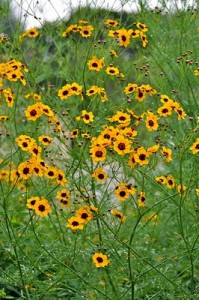
 Texas transforms into a beautiful floral painting each year as spring ushers in. Wildflowers don’t just dot the landscape, they envelop it. Vibrant colors billow in the breeze, changing from month to month as different wildflower blooms open up, each in its own time.
Texas transforms into a beautiful floral painting each year as spring ushers in. Wildflowers don’t just dot the landscape, they envelop it. Vibrant colors billow in the breeze, changing from month to month as different wildflower blooms open up, each in its own time.
If wildflowers can survive in the harsh conditions along Texas highways, you can grow them in your garden, too.
Wildflowers are easy to grow in the home garden. A little soil contact and a little water and you’re ready to go. Frankly, the most common problem for home gardeners is that they baby them too much.
Getting started
Wildflowers need a lot of sun and direct soil contact. Seeds don’t like mulch – it prevents the ground contact they require to germinate. And even if one does germinate under some mulch, that scrawny little seedling doesn’t have a chance against that chunk of wood. If you’re not starting on a bare patch of soil and are sowing in an existing meadow area, you’ll have less immediate contact, but over time wind and weather will also help some seeds find their way down to the ground, just like Mother Nature does every year. You can help that along by raking the seeds into the soil or sprinkling a light covering of soil over them.
Seedlings need water to germinate and should be kept moist until they come up and are stronger, taller seedlings. Once they’re up, you should water them very lightly about twice a week for 2-3 weeks. Then you can water occasionally, depending on whether or not we get the rain we’re predicted to have this fall. But don’t overwater them once they’re up and going. Most wildflowers also prefer well-drained soil, so if you garden in heavy clay, you might want to amend the planting area with something like a little decomposed granite.
Remember, when those spring bloomers germinate in the fall, they start developing a little foliage to carry them through the winter. And though they aren’t growing much or blooming, they will spend the cold season growing roots and getting ready for spring. If we’re not getting any rain at all, you’ll have a much better crop of flowers if you give them a drink now and then. But don’t fertilize them once they’re growing – that will encourage lush, healthy foliage, but not blooms.
Which wildflowers to start with
You’ll have more success with native Texas wildflowers, because they are accustomed to our different soil types. Bluebonnets do particularly well in the alkaline soil and limestone here in Central Texas.
John Thomas, founder and president of Wildseed Farms in Frederickburg, recommends that gardeners plant collections of mixed Texas Wildflowers when they are starting out.
“For the typical homeowner, I recommend a wildflower mix, a blend of seed that works well throughout Texas,” said Thomas. “This increases their chance of success, and you learn what grows best in your soil. Then you can buy more of those the next time you plant.”
With 37 years of experience in farming and ranching, Thomas started in the turf seeding business and began to focus on native grasses. When asked about growing wildflowers, he discovered that they were difficult to find and decided that he could fill that void.
“Someone needed to be growing native wildflowers,” he said.
So he changed his focus and started Wildseed Farms, the largest working wildflower farm in the U.S. It has 200 plus cultivated acres at its Hill Country headquarters and another 800 acres at its growing, packing and distribution center in Eagle Lake.
Thomas pioneered the practice of planting wildflowers in rows on large acreage and produced specialized planting machinery able to handle tiny wildflower seeds.
Between the two farms, Wildseed produces 88 varieties of wildflower seeds, which are available individually and as regional mixes, specialty mixes or custom blends.
According to Thomas, October is “prime time” for wildflower seed planting in the Austin area.
If you’re looking for ideas about which seeds to plant or you are trying to remember the name of that beautiful bloom you enjoyed seeing along the highway in April, check out the Lady Bird Johnson Wildflower Center’s website at www.wildflower.org. They have an online library of more than 7,200 native plants and detailed information about what to grow and how to grow it. And the beautiful grounds of the Wildflower Center are open year-round to inspire and educate visitors.

